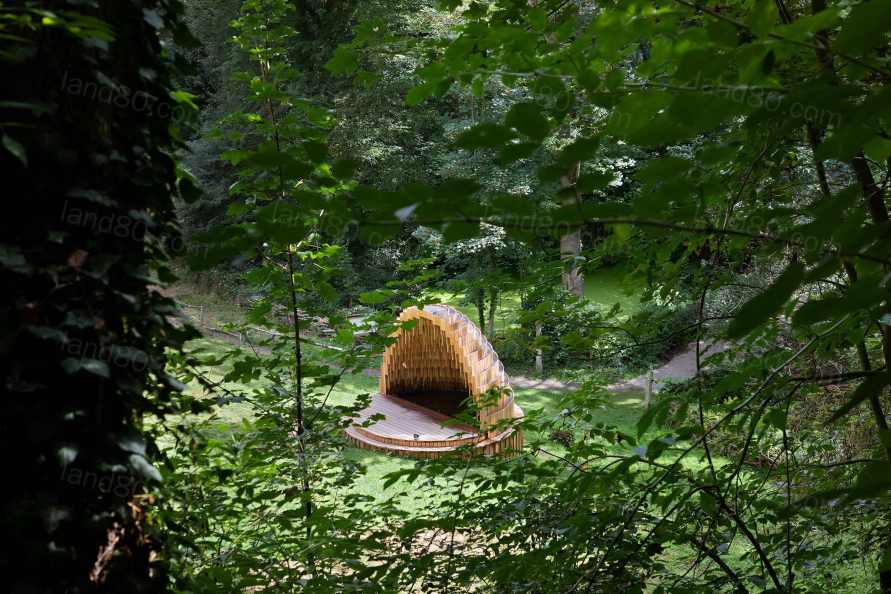△项目视频 Video ©naaro
雨的放大器是一座雪松包覆的雨水雕塑和舞台,位于比利时Sint-Arnolduspark的天主教森林环境中。项目位于一座小山丘上,作为一个天然的露天剧场,舞台的设计是为了举办露天表演,而穹顶作为雕塑背景。该项目是"Contrei Live"艺术路线的一部分,该路线包括在佛兰德斯西南地区的16个艺术项目,邀请游客思考水在景观中的重要性。
The Rain Amplifier is a cedar-clad rain sculpture
and stage, situated in the Catholic forest environment of Sint-Arnolduspark,
Belgium. Located on a hill that acts as a natural amphitheatre, the stage is
designed to host open-air performances where the dome acts as a sculptural
backdrop. The project is part of the ‘Contrei Live’ Arts trail which includes
16 land art interventions in the region of South West Flanders that invite
visitors to reflect on the importance of water in the landscape.

在经历了几次奇迹般的愈合之后,Sint-Arnoldus公园于19世纪末建成。场地的治愈力量归功于公园里的一个自然水泉,通过创建一个喷泉向公众开放。这使得公园成为人们朝圣的目的地。喷泉是公园里建造的众多历史文物之一,其中包括天主教教堂、人工岩洞结构、乡村水泥桥、一系列池塘和骑兵十字。
Sint-Arnolduspark was established at the end of
the 19th century, after the occurrence of several miraculous healings on the
site. The healing powers of the site were attributed to a natural water spring
in the park which was made available to the public through the creation of a
fountain. This established the park as a pilgrimage destination. The water
fountain is one of many historical objects that were built in the park,
including Catholic chapels, artificial grotto structures, rustic cement
bridges, a series of ponds and a cavalry cross.

项目雨的放大器在这些折衷主义和水元素的混合体中找到了自己。该项目通过其表演功能吸引游客,提供了一个新的焦点。同时,雨的效果旨在鼓励游客反思他们与雨的关系,以及雨在社会和自然中扮演的角色。在2020年,5月和4月是比利时自1833年以来最干燥的月份。作为气候变化的预测效应,在不久的将来,比利时的极度干旱和极度降水的时刻都将更加普遍。
The Rain Amplifier finds itself amidst this
eclectic amalgamation of follies and water elements. The project provides a new
focal point by attracting visitors to its performative function. At the same
time, the rain effect is intended to encourage the visitor to reflect on their
relation with rain and the role rain plays in society and nature. In 2020, May
and April have been the driest months in Belgium since 1833. As a predicted
effect of climate change, both moments of extreme drought and extreme
precipitation will be more common in Belgium in the near future.



从几何学上看,雕塑像一个半圆的穹顶,内部有复杂而富有表现力的装饰,以此作为公园内存在的天主教建筑的参考。在穹顶内,通过一个隐藏的相互连接的管道和喷嘴的网络系统,产生了人工雨淋。雨声的放大是穹顶形式的结果,创造了一个动态的声景,可以在其环境中体验。使用红柏作为包裹层,是因为它具有很高的防水性能,而且不同的木材元素具有丰富的色泽。
Geometrically the sculpture resembles a half dome
with an intricate and expressive ornamental interior as a reference to Catholic
architecture that exists in the park. Within the dome, an artificial rain
shower is produced through a network system of hidden interconnected tubes and
nozzles. The amplification of the sound of the water is a result of the dome
form, creating a dynamic soundscape to be experienced in its environment. Cedar
is used as cladding because of its high water-resistant performance and the
rich variety of colour tones of the different timber elements.


雨水放大器"是一座雕塑,它提供了一个反思雨水和我们与雨水关系的空间。它提醒我们雨水的历史文化意义,以及应对当代气候变化相关挑战的重要性。它是一个通过音乐或戏剧表演的方式来庆祝雨水的地方。
Rain Amplifier is a sculpture that provides the
space to reflect on rain and our relation to it. It reminds us of its
historical-cultural significance and the importance of addressing contemporary
challenges related to climate change. It is a place to celebrate rain through
the means of musical or theatrical performance.

Project name:Rain Amplifier
Company name:Matthijs la Roi Architects Ltd.
Website:www.matthijslaroi.com
Contact e-mail:m.laroi@matthijslaroi.com
Project location:Tiegem, Belgium50°48'59.1"N
3°27'53.8"E
Completion Year:2020
Building area (.0m²):20m2
Concept Design:Matthijs la Roi
Architects, Matthijs la Roi
Technical Design: Matthijs la Roi
Architects, Matthijs la Roi, Simone
Tchonova
Client: Intermunicipal organisation Leiedal
Structural Engineering:Format Engineers
Photo credits:naaro, www.naaro.com
|